Photo

notes on the revolt of 1857 and article 370 🍃 prep for entrances is intense af lmao
7 notes
·
View notes
Text
fictional kiss things that end me
being unable to open their eyes for a few moments afterward
one small kiss, pulling away for an instant, then devouring each other
pressing their foreheads together while kissing
speaking normally, then after the kiss their voice is hoarse
guys furrowing their brow when kissing passionately
staring at the other’s lips, trying not to kiss them, before giving in
running their thumb over the other’s lips
when they lean forward a fraction as if to kiss the other person, then realize they shouldn’t and pull back to stop themselves
ripping the other away - “no we shouldn’t” - but when they kiss them again they moan and hold them close
one sliding their hand into the other’s hair slowly
their entire body freezing for a second when their love kisses them
accidentally being forced inches apart from each other, staring at each other’s lips, and just before they kiss someone pulls them back apart
when one stops the kiss to whisper “I’m sorry, are you sure you-” and they answer by kissing them more
a hoarse whisper “kiss me”
then licks their lips and says “please”
268K notes
·
View notes
Photo




Better make up your mind
What do you mean?
3K notes
·
View notes
Photo
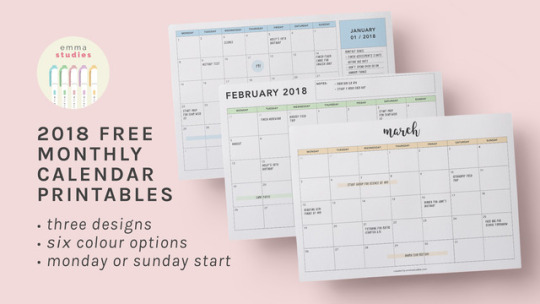
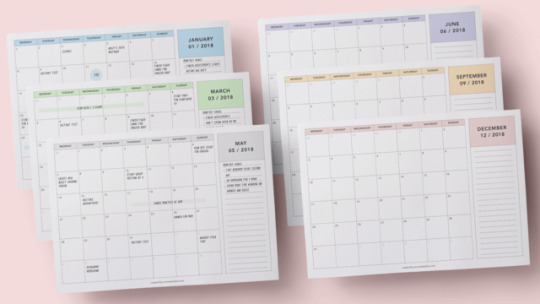
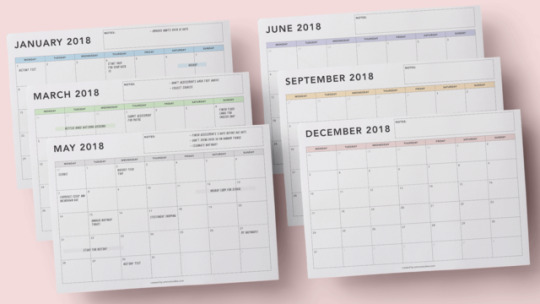
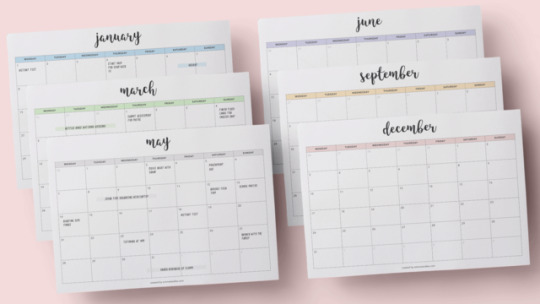

With the new semester starting up soon, I was getting a lot of requests to release 2018 versions of my printable calendars! Like my 2017 versions, there are three design options, different colours (blue, green, grey, purple, peach, pink), and the option of a Monday or Sunday start date.
For ease, I’ve created entire Google Drive folders for each design (version one being the top, two being the middle, and three the bottom), then separated by their starting day. You can then chose your preferred colour and print! The files are in PDF form and feature all 12 months of the year in the single download. Click the links below to pick your calendar!
Version one folder
Version two folder
Version three folder
I hope you enjoy using these and if so, I’d love to see them in action! Feel free to tag me on Tumblr with #emmastudies or on Instagram with my username @emmastudiess in any photos you upload. If there are any problems or errors, please let me know via my inbox.
Disclaimer: This printable is for personal use only. You may edit it yourself if you like, but please do not redistribute without my permission. Thank you!
9K notes
·
View notes
Text
Useful Words/Phrases Pt.2
그만큼 - That much
많이 - Many/A lot
빨리 - Quickly/Fast
갑자기 - Suddenly
어쨌든 - Anyway
아마 - Probably
방금 - Just/ A moment ago
잠깐만 - Wait a minute
마지막 - Last
혹시 - By any chance
역시 - As expected/ Also/ Either
오랜만이에요 - Long time no see
이렇게 - Like this
때문에 - Because
그런가/그렇습니까? - Is that so
실례합니다 - Excuse me
실례지만 - Excuse me but
설마! - No way!
같아 - Same
몰라요 - I don’t know
알아요 - I know
그렇죠? - Right?
Part 1~
A&R🍑

2K notes
·
View notes
Text
im so ready to be in a relationship so whenever the universe is ready hmu with a keeper
748K notes
·
View notes
Text
Planning Your Degree
Unlike high school where you had a limited range of electives to choose from and a couple of eligibility and progression criteria to keep in mind (10 units minimum for the HSC, at least 4 subjects, 2 mandatory units of English, etc.), university has dozens of electives and entire handbooks with enough fine print to make you cry. You’re often left to navigate the waters (of your tears) yourself, since academic advisers aren’t as accessible – there’s hundreds of students in a department or faculty, and only a couple of them to go around.
Not to say you shouldn’t try to get in touch with academic advisers! Certainly, if you encounter any difficulties you should get in touch with them. I’d love to provide a list but there are advisers for different faculties, departments and schools just at Usyd, so you can imagine how long a complete list would be for every major university in Sydney. Besides, advisers often change without notice.
Ultimately, you’re responsible for ensuring you’ve taken mandatory subjects, any prereqs for senior subjects, that you’re not under or over-loading your units, that you’re on track to meet the required number of credit points or units for graduation, etc. That said, not even meticulous planning can save you from the incompetence of uni bureaucracy. That’s just something you’ll have to learn to tolerate.
Just remember:
YOUR HANDBOOK IS YOUR BEST FRIEND
To make life marginally easier, bookmark your degree handbook and always refer back to it before and after semester to make sure you’re fulfilling your requirements.
UTS handbooks
USYD handbooks
UNSW handbooks
Macquarie handbooks
WSU handbooks
These are all undergraduate handbooks btw, don’t confuse yourself with the postgrad handbooks. They contain essential information on admission, requirements, attendance, core/compulsory units of study/subjects, etc.
Spot the Difference (or not)
One of the horrible (truly horrible) things about degree planning between universities is the lack of consistent terminology. This drove me through several walls in my planning. A “major” at Usyd is also a “major” at UNSW, though it’s interchangeable with “area of specialisation”. Usyd “units of study” are UNSW “courses”. Aren’t you missing NESA and nice, straightforward Board Approved Courses now.
There are other terms like streams, sub-majors and sub-structures but they’re university-specific and with some digging you can find what you’re looking for. These are just the most common terms you’ll encounter and need knowledge of.

Lmao WSU what even
It’s tempting to plan your entire degree in advance, which while showing excellent organisation and foresight, doesn’t account for the messier reality of new and cancelled units, and units that were offered in one semester suddenly being offered in another. Trust me on this. You can only deal with so much administrative bullshit before shorting out. Sure, you can tentatively assume where exchange or internships might go, but don’t assume a unit you had an eye on for 2019 semester 1 will definitely run in 2019 semester 1 (even the compulsory ones can switch around randomly).
Using Excel
It’s also helpful to map your degree in an Excel spreadsheet – maybe do this after you’ve gotten your ATAR and are tossing up between two or three degrees.

It’s not exactly art but it serves its purpose. Down the side you can see I’ve divided my study into semesters and across the top I’ve included the components of my degree. Because I took INGS, I had:
an International Studies core (4 INGS units of study)
a language core (3 language units of study)
a compulsory major (8 units of study, 6 of which are senior units)
a second major (I could have chosen electives but I wanted to double major)
compulsory exchange (4 units of study approved by my departments)
You’ll also notice the purple row and column at the bottom and far right. Those are my total credit points (I know it says “UOC” but that was because my first table was for UNSW B International Studies and they use “units of credit”). It’s vital that you keep track of how many credit points you’ve done!! If you don’t meet the requirements you jeopardise graduation (which is why it’s ESSENTIAL to make sure you get academic approval for any subjects you might take on exchange.)
I returned to this outline after each semester to make sure I was on track, and to confirm how many units I would need to take next semester.
Choosing Your Units
.. or units of study, subjects, courses. This is going to be a more general section since I can’t possibly provide reliable advice on specific units in specific degrees.
The first thing you should ask is: IS THIS UNIT COMPULSORY? It sounds obvious but hey, you need to pass compulsory units to graduate. You should also be aware if those units have prerequisites or are prereqs themselves for senior units, as that will affect the order in which you take them. In first year it’s relatively easy to determine which units you’ll do (starting from scratch), but once you hit second year, depending on your degree, there’s some flexibility.
For example, I have law friends who’ve played around with matching different compulsory law units to make for a more interesting semester. One of these friends, doing a double degree in Commerce and Law, also tried to balance her Commerce and Law subjects to take the edge off reading-heavy law units and keep herself sane.
If you have electives, have fun with them! Shop around, but consult your handbook to ensure your unit of choice will count towards your degree.
Your choice will depend on a combination of factors:
Prerequisites, corequisites, and prohibitions
Availability - semester 1 or 2? trimester 1, 2 or 3?
Your personal interest
Quality of lecturer/tutor - consult your network, keep an eye and ear open for the good ones
Timetabling - important for those who have work (also ties in with attendance-as-assessment)
Assessments - units with heavily-weighted exams or several small assessments might not be so attractive
How well a unit complements your major(s) - this one is a bit understated and perhaps more applicable to the Humanities, e.g. my social research units complemented my media politics unit very well
Degree planning can be a pain, particularly for those with 5-6 year degrees, but it’s so important you’re on top of your units to ensure all that hard work and suffering pays off at graduation.
73 notes
·
View notes
Text
REBLOG IF
- you are a studyblr
- you are super friendly
- you love when people message you
- you want to support everyone in the community
one thing i love about this community is that it is one big family and everyone is ready to support eachother. reblog this and follow the people that also reblog and start some super cute supportive friendships because you all deserve the best
13K notes
·
View notes
Photo
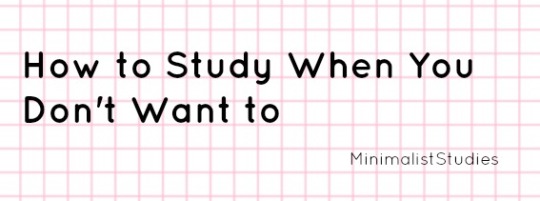
We’ve all been there: You have stuff you need to get done, you know you need to get it done, but no matter what you do you just cant get yourself to take out your stuff and do your work.
I have this problem quite a lot, so here’s a post to help some of you out!
Articles
Read this to get some quick motivation (tw: curse words) It’s sure to get your blood pumping and give you the vigor you’re lacking!
Harvard’s solutions on how to stop putting stuff off
7 helpful study tips
8 helpful study tips
Manage your time studying
How to seriously study
Detailed article on how to get motivated to study
10 study motivation quotes for all types of students
3 scientific backed study motivators
Videos
Unbroken
Dream (EXTREMELY INSPIRING)
Be Phenomenal
Why Do We Fall
Mindshift
Be Hungry
Stop Killing Time
Destiny
Vision
You Will Win
Study Spotify Playlists
Deep Focus
Peaceful Piano
Intense Studying
Productive Morning
Electronic Study Music
Study Time Starts Now
White Noise
Epic All Nighter
Focus Now
Late Night Focus
Genius Time
Nice and Easy Workflow
Motivating Study Blogs
@elkstudies, @getstudyblr, @minimaliststudies, @nehrdist, @tbhstudying, @highschoolering, @saturdaystudying, @stxdybug, @dangostudy, @raavenclaw, @academla
There are so many more studyblr’s, but those are just some I can think of off the top of my head!
I hope this helps motivate some of you guys, and good luck with all of your studies! (੭*ˊᵕˋ)੭*:・゚✧
17K notes
·
View notes
Text
types of study breaks for every situation
if you realize you’ve been studying for hours: grab a snack to refuel your body and watch a sitcom to refuel your brain. then back to the books.
if you’re feeling stressed out: take some deep breaths, text your friends, maybe stare at a wall for a few minutes. gather yourself.
if you can’t seem to focus: get moving and get outside. take out the garbage, check your mail box, maybe walk your dog. just get moving and get fresh air. it’ll help bring you back.
if there’s something else going on in your life and you can’t get it off your mind: write down what’s going through your head, sort of like a diary entry. it’ll help you work things out.
if you’re just mentally and physically exhausted: set a timer for 25-30 minutes and take a nap. any longer and you’ll hit REM and you’ll wake up feeling just as tired. once you wake up, get some caffeine in you.
if the material is boring as hell: find another way to study. see if there’s a crash course video online about it or draw out what you’re trying to learn in diagrams and pictures to make it fun.
if people around you won’t shut up: listen to some music. soundtrack and classical music is always good because they won’t absorb you as much as music with lyrics. white noise (like ocean waves, rain sounds, etc.) also works.
if you only half understand a concept: call/message a friend who’s not in the class and try to teach the material to them. this will help you mentally work through the material and will help you remember it as well.
93K notes
·
View notes
Text
hello and all alone, any one really.
bias: dowoon and jae i'm sorry i don't have just one
for science and my own curiosity, reblog with your favourite every day6 song and your bias and I️ will personally compile and organize the data in a graph as a celebration of the final every day6 song in december
958 notes
·
View notes
Photo

let's say i finally got around to doing some chemistry 10.28.17
#studyblr#studyspo#studyspiration#studysthetics#study motivation#chemistry#chemistry notes#science#student notes
568 notes
·
View notes
Video
This video makes me wanna cry. I love this song so much. I love Taekook so much.
©kookvbot ♥️
751 notes
·
View notes
Text
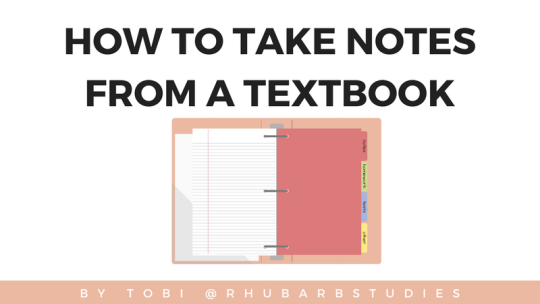
Taking textbook notes is a chore. It’s tedious and boring and sometimes challenging, but hopefully these tips will help you improve your skill and shorten the time it takes you to do textbook notes!
Give yourself time: Realistically, you can’t knock out 30 pages of notes in 20 minutes. Take your time with textbook notes so they’re a good studying tool in the future. The general rule is to take how many pages you have to do and multiply it by 5: that’s how many minutes it’ll take you to do the notes.
Also, divide you notes up into manageable chunks to increase your productivity. I am personally a huge fan of using pomodoro timers, and I adjust the intervals for however long I need to.
Skim before you start taking notes: If time is an issue, don’t read your 40 page in depth before even picking up a pen, but make sure you know what you’re reading about by skimming a bit ahead of your notes. Read over section titles, and look at charts, maps, or graphs. Writing and highlighting as you read the chapter for the first time isn’t effective because you don’t know if a sentence will be important or not, so make sure you’re reading a paragraph or section in advance before writing.
Use the format they give you in the book to help take your notes: In a lot of textbooks, there will be a mini outline before the chapter itself that shows all the headings and subheadings. Those will be your guidelines! I find this super helpful because long chapters can be daunting to go into without any structure. If you don’t have one of those, use the headings and subheadings provided for you. If you haven’t already been doing this, it will help you so much.
Read actively: It’s so easy to “read” a textbook without digesting any information, but that is the last thing you want to do. Not only does it make taking notes a million times harder, but you’ll be lost in class discussions because you didn’t understand the reading. To keep from passively reading, highlight, underline, star any important information in the book itself.
Have a color coding system for highlighting or underlining and write down a key somewhere (here’s a few that you can adjust for your needs: x,x)
Use sticky notes or tabs to mark any questions or important points to come back to
Summarize important information and paraphrase: When taking the actual notes, don’t copy down full sentences word for word. Not only does writing full sentences waste a lot of time, it’s not an effective way to learn. If you can paraphrase the information, then you understand it. It’s also easier to study notes which are in your own words instead of textbook academia writing.
Be selective: You shouldn’t be writing down every fact that comes up in your textbook. If a fact ties into the bigger topic and provides evidence, then it’s probably something to keep, but you don’t need every piece of supplemental information (but do make sure you always write down the vocab). Learn your teacher’s testing style to help you decide what to write down. Could this be on the quiz/test? If the answer is yes, make sure you write it down.
Learn to abbreviate: Just like writing full sentences, writing out full words will waste time. Implement some shortenings (make sure to use ones that you’ll understand later!) into your notes. Some common ones are: b/c=because, gov=government, w/o=without, and here’s a great list of a ton of examples of abbreviations and shortenings.
Answer margin and review questions: A lot of textbooks have margin questions on every page or so that sum up what’s really important about that information. Make sure not to skip them because they’re really helpful for understanding. Write them down and answer them clearly in your notes. Most textbooks also have review questions after the chapter that check for reading comprehension, so make sure to answer those because they’ll show you if you really understood the chapter.
Don’t skip over visual sources: Maps, diagrams, illustrations, charts, and any other visuals in textbooks are so helpful. If you’re a visual learner, these things will be so essential to you and how you understand what you’re reading. Charts, tables, and diagrams sometimes also summarize information, so if you’re a visual learner it might benefit you to copy those down instead of writing it out.
Add visuals if it’ll help you: As said above, copying down charts, tables, illustrations, or diagrams can be super helpful for visual learners. They’re clear and concise, so pay attention to them.
Write your notes in a way that’s effective and makes sense to you: Mindmaps, Cornell notes, or plain outline notes are all really good forms of notetaking. Find which one works best for you to understand them and which one is most effective for your class, and use it (stuff on mindmaps and cornell notes).
Combine your class and textbook notes: If you rewrite your class notes, add in information you think is relevant from your textbook notes. Mark anything both your book and teacher said were important–you don’t want to forget any of that. If you don’t rewrite class notes, then put stars next to anything repeated.
18K notes
·
View notes

